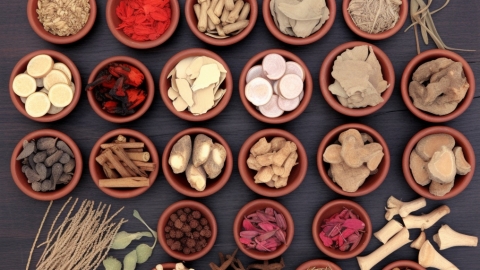What should not be eaten during the period of taking traditional Chinese medicine?
Generally, during the period of taking traditional Chinese medicine (TCM), one should avoid eating foods such as radish, strong tea, crab, chili peppers, and mung beans. It is also necessary to avoid taking certain medications, including Ferrous Sulfate Tablets, Norfloxacin Capsules, Digoxin Tablets, Warfarin Sodium Tablets, and Phenobarbital Tablets. The specific reasons are as follows:
I. Food
1. Radish
Radish has the effect of promoting and breaking up Qi. If you are taking Qi-tonifying Chinese herbs such as ginseng or astragalus, radish may weaken their Qi-nourishing effects, thereby reducing the therapeutic effectiveness of the herbal treatment and failing to achieve the expected regulatory or therapeutic goal.
2. Strong Tea
Strong tea contains a high amount of tannic acid, which can combine with alkaloids and proteins—the effective components in Chinese herbal medicine—to form precipitates that are difficult for the body to absorb. This reduces the absorption rate of the effective herbal components, thus affecting the efficacy of the TCM treatment.

3. Crab
Crab is cold in nature and contains foreign proteins. If you are taking warming and cold-dispelling herbs, the cold nature of crab may counteract the warming effects of the herbs. Additionally, the foreign proteins may react with herbal components, potentially irritating the gastrointestinal tract, affecting the absorption of TCM, and even causing discomfort.
4. Chili Peppers
Chili peppers are hot and spicy in nature. If you are taking herbs that clear internal heat or nourish Yin and moisten dryness, the heat from chili peppers may counteract the medicinal effects of these herbs, intensifying internal heat symptoms. This not only reduces the efficacy of the herbal medicine but may also worsen symptoms such as dry mouth and sore throat.
5. Mung Beans
Mung beans have the effects of clearing heat and detoxifying, as well as promoting diuresis. If you are taking warming and nourishing herbs, mung beans may reduce their therapeutic effects. Furthermore, mung beans may combine with certain herbal components, affecting drug absorption and interfering with treatment outcomes.
II. Medications
1. Ferrous Sulfate Tablets
Ferrous Sulfate Tablets are iron supplements. Tannins and alkaloids in Chinese herbal medicine may bind with iron to form insoluble precipitates, hindering iron absorption and also affecting the absorption of effective herbal components, thereby reducing the efficacy of both agents.
2. Norfloxacin Capsules
Norfloxacin Capsules belong to the quinolone class of antibiotics. Tannins and metal ions in Chinese herbal medicine may bind with this drug, reducing its absorption rate and total absorption, weakening the antibacterial effect of norfloxacin, and affecting the treatment of infections.
3. Digoxin Tablets
Digoxin Tablets are cardiac glycosides, with a therapeutic dose close to the toxic dose. Some Chinese herbs may act synergistically with digoxin, increasing its blood concentration and potentially causing toxic reactions such as arrhythmia.
4. Warfarin Sodium Tablets
Warfarin Sodium Tablets are anticoagulant medications. Many Chinese herbs have blood-activating properties, and when taken together with Warfarin Sodium Tablets, they may enhance anticoagulant effects, increasing the risk of bleeding, such as gum bleeding, skin bruising, and, in severe cases, gastrointestinal bleeding.
5. Phenobarbital Tablets
Phenobarbital Tablets are sedative-hypnotic drugs and are liver enzyme inducers. They can accelerate the metabolism of effective herbal components in the liver, lowering their concentration in the body, shortening the duration of herbal effects, and thus affecting the therapeutic effectiveness of TCM.
During the regular intake of traditional Chinese medicine, one should maintain a light diet, follow a regular作息 schedule, and avoid staying up late or overexertion. If other medications are required for another illness, be sure to consult the TCM doctor in advance to determine the appropriate time interval or adjust the medication plan, ensuring medication safety and the effectiveness of the herbal treatment.




